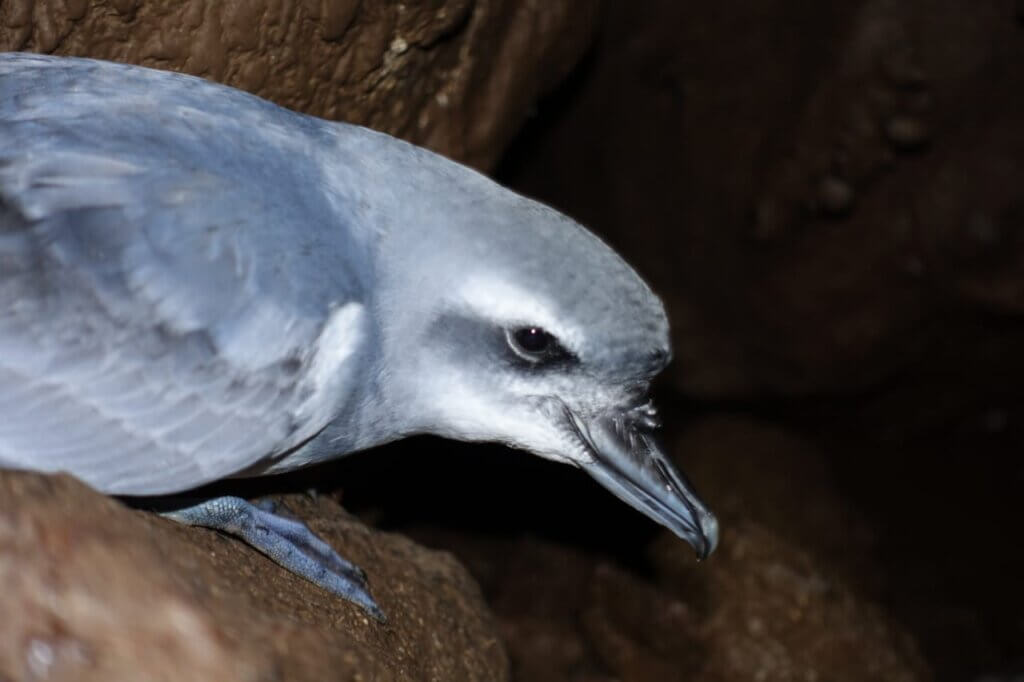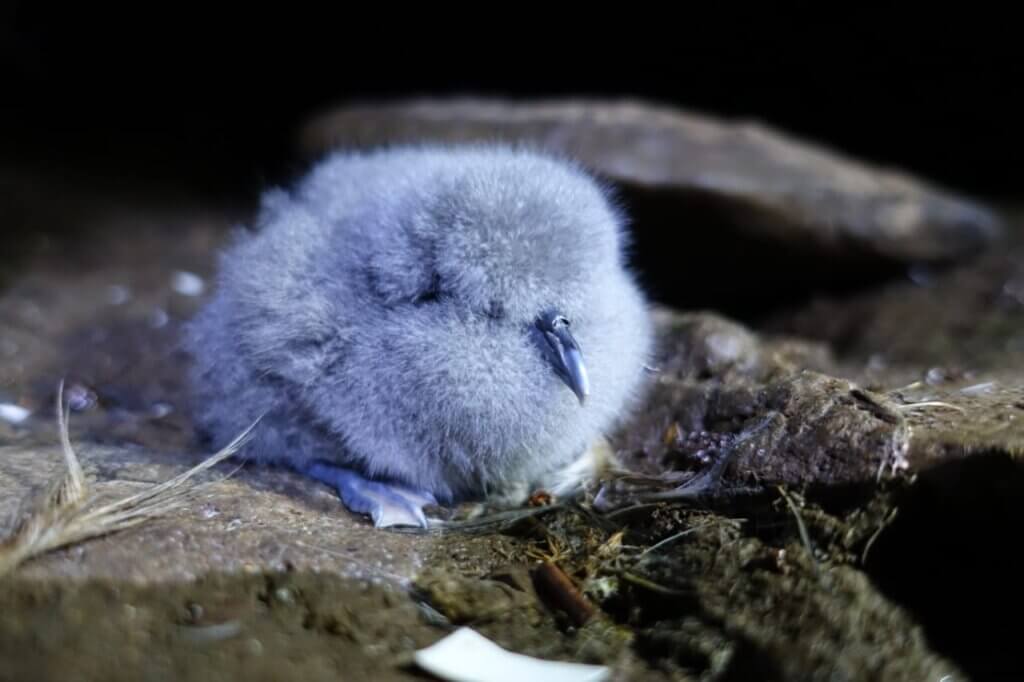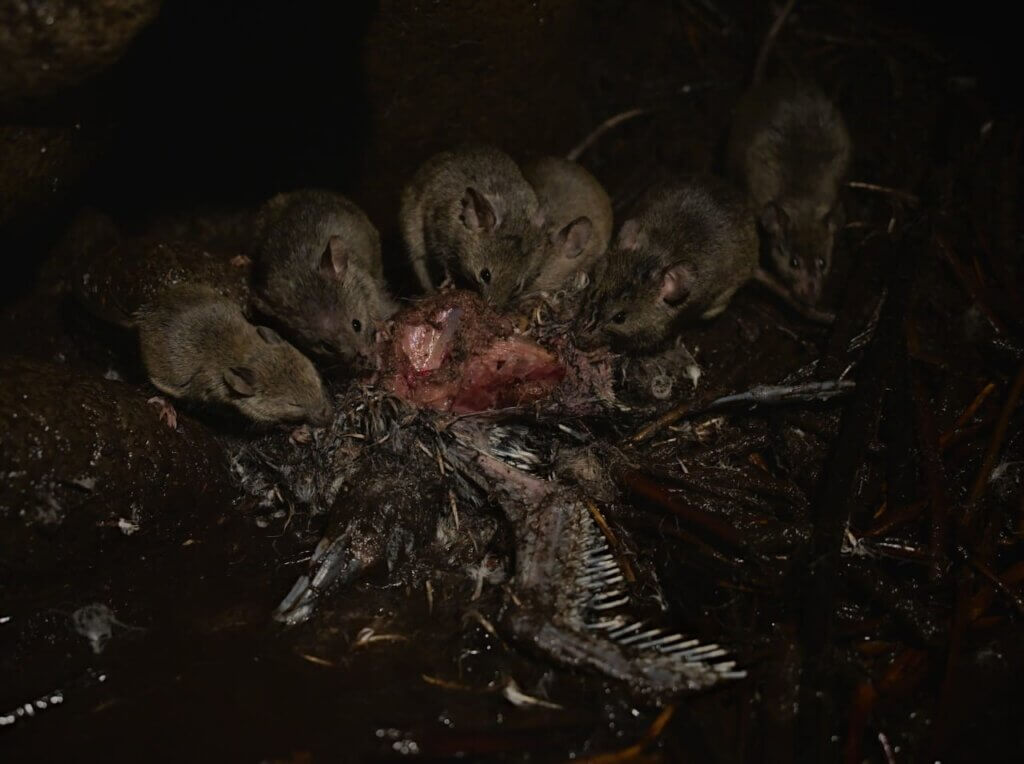Endangered seabird inches closer to extinction on UK Overseas Territory

- All but one of this year’s MacGillivray’s prion chicks at a monitoring site have died, reinforcing fears that this endangered species is edging closer to extinction.
- Invasive non-native mice are the cause of the deaths. Since monitoring began at this site in 2014 only 21 chicks have fledged from 370 monitored nests, with this year’s one remaining chick having very little chance of surviving long enough to leave the nest.
- New analysis by the RSPB predicts that, unless the mice are removed from Gough Island, the MacGillivray’s prion may be lost from Gough forever.

All but one chick of a threatened seabird have died this year at a monitoring site, putting the long-term future of the species in jeopardy. This is another devastating year for the endangered MacGillivray’s prions on Gough Island, a UK Overseas Territory island and globally important seabird nesting site in the South Atlantic.
Only one chick is still alive out of 50 monitored nests, with invasive mice eating many of the newly hatched chicks.

Mice were inadvertently introduced to Gough Island in the 19th century, most probably by sealers. The mice have since adapted to feed on a nutritious and plentiful food source – the seabirds. These mice are now a very real threat to the eight million breeding birds who live on Gough, including the Endangered MacGillivray’s prion and the Critically Endangered Tristan Albatross. Invasive rodents have already been responsible for the local extinction of MacGillivray’s prions from two French Southern Territory islands in the Indian Ocean.
The RSPB has been monitoring a group of these burrow-nesting nocturnal birds in a cave since 2014. The survival rate in this cave is seen as an indicator of how the birds are doing all over the island.
Since 2017 only one chick has fledged at this site. This is due to mice eating the chicks, or parents deserting the eggs because they themselves are being attacked by the mice. It is thought that these mice are largely responsible for the collapse of MacGillivray’s prion populations on Gough Island from about 3.5 million pairs in 1956, to 175,000 pairs in 2020.
A new paper, published in the journal Animal Conservation on Monday 15 February, predicts that these birds will continue to decline by 9% each year if mice remain on the island, with a 31% chance that they will go extinct on Gough by 2057. If the mice are eradicated, however, there is a high likelihood that the population will stabilise and slowly recover.
The RSPB, in partnership with Tristan da Cunha and others, are undertaking an ambitious project this year to restore the fortunes of millions of seabirds by eradicating every single mouse from Gough Island. This project was originally projected to take place in 2020 but was delayed due to the coronavirus.
Kim Stevens, RSPB’s Senior Field Assistant on Gough Island, said: “It’s so upsetting that, yet again, so many of these little chicks have died. MacGillivray’s prions only lay one egg a year, so for that one egg to never make it to adulthood, year after year, is just heart-wrenching. Even the precious chick which is still alive still has seven weeks to go before it can fly so there’s a very small chance it will make it. But, with the restoration project so close at hand, I have every hope that we will soon be able to make this island a global haven for seabirds once more, helping to revive our world.”
For more information about the project, or to donate, please visit https://www.rspb.org.uk/our-work/conservation/projects/gough-island-restoration-programme/.
ENDS
[registration_form]
We can only wish the RSPB every good fortune in this very major project this year aimed at eliminating the large non native carnivorous mice from Gough Island in the south Atlantic. Besides Macgillivrays prion being critically endangered, there is the Northern Rock hopper penguin, the Tristan Albatross and the Gough Island bunting which are all critically endangered and which essentially only occur on Gough Island. So the success of this project this summer is so very important.
We tend to focus on the wildlife of these islands, quite reasonably, when we are having to put up with the disgusting performances towards our wildlife of this Westminster Government. However about 90% of the critically endangered species that are under the UK’s responsibility occur in our U.K. Overseas Territories rather than in these islands. I think this Is sometimes overlooked but we must not do that. With such a terrible unresponsive Government here in the U.K. it may well be better and more productive to focus,just now, on our Overseas Territories especially as in most of these the £ probably goes a fair bit further than here at home.
Every best wish to the RSPB for this absolutely vital project this summer.
Rats and mice have been successfully eliminated from other oceanic islands so we have to hope that this feat can be repeated again here. Hopefully this can be done before it is too late for MacGillivray’s Prion but even if not, it must be attempted for the sake of all the other nesting seabirds on Gough Island.
Evidently there is not much most of us can do to help with a project of this kind – other than contribute to its funding. I don’t know whether there is a direct fund to which one can contribute but, hopefully, those who from time to time threaten to stop their RSPB membership because it is too cautious, too corporate, too bureaucratic or whatever, will reconsider. There are very few organisations that can undertake this kind of project.
I am not suggesting that the RSPB should be immune from criticism but simply pointing out that it remains a vitally important player in the conservation of biodiversity and is uniquely able to carry out some important projects.
A welcome donation to this vital project can be made on the RSPB web site. Go to the RSPB’s web site and type in “ Gough Island restoration project” page down to the blogs where you will find a donation link. I used it this morning
Couldn’t agree more, Jonathan. This project is RSPB at its best – possibly because its such a clear cut case without the politics and opposing views through which most of real life has to struggle. Yes, there are things to criticise or debate but we should be able to do that whilst recognising RSPB’s central ,crucial role in British and worldwide conservation. As Bill Oddie once (memorably) said ‘if you’re not a member you should have your Bins taken away’.
The very best of luck to this challenging and vital project !